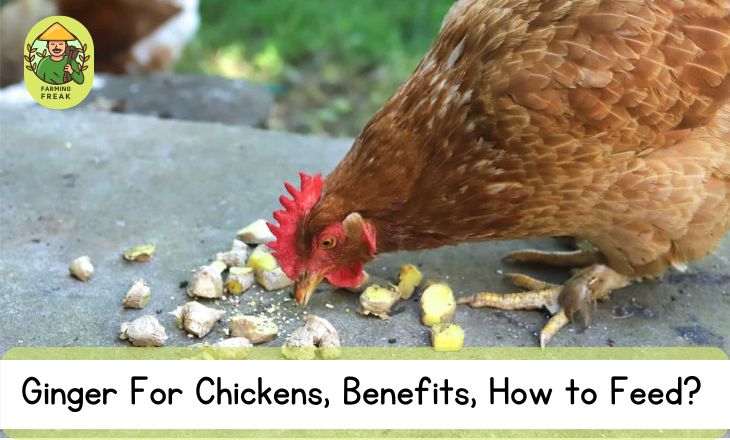Chickens, those quirky and lovable feathered friends of the farming world, are known to have quite a diverse palate. From grains to bugs and even the occasional kitchen scraps, these birds seem to enjoy a variety of treats. But have you ever wondered that, Can Chickens Have Ginger?
This age-old question has sparked debates among poultry enthusiasts and backyard farmers alike. As we delve into the intriguing realm of Ginger For Chickens, let’s uncover the truth behind this spicy dilemma and explore whether our clucking companions can handle a taste of this exotic root.
Can Chickens Have Ginger?
The answer to this question is quite simple, Chickens can consume ginger in moderation, as it offers various health benefits for them. Ginger contains anti-inflammatory properties that can help with joint pain and swelling in chickens, ginger is known to aid digestion in chickens by improving gut health and combating digestive issues.
It is essential to feed ginger to chickens in small amounts, as too much can lead to potential side effects such as gastrointestinal upset. It is recommended to provide grated or finely chopped ginger as a treat occasionally rather than a regular part of their diet. Incorporating ginger into a chicken’s diet can be beneficial when done cautiously and in moderation.
Benefits of Ginger for Chickens
- Ginger can help boost the immune system of chickens like Kaffir Lime Leaves, making them less susceptible to various diseases and infections. Its anti-inflammatory properties can also aid in reducing inflammation in the respiratory system.
- The natural antioxidants present in ginger may enhance the overall health and well-being of chickens by combating oxidative stress and free radical damage. This can result in improved productivity and egg quality.
- Adding ginger to the diet of chickens may help promote proper digestion and nutrient absorption, leading to better growth rates and feather quality.
It can also act as a natural dewormer, helping to keep parasites at bay without the use of chemical treatments. - The anti-inflammatory properties of ginger can also aid in reducing inflammation in the digestive tract, promoting better digestion and nutrient absorption for chickens.
How to Feed Ginger to Chickens
Provide a balanced diet of commercial chicken feed, supplemented with grains, fruits like orchards, and vegetables. When feeding ginger to your flock, it’s important to do so in moderation. You can grate fresh ginger and mix it into their feed or water for added flavor and nutrients.
Make sure they have access to fresh water at all times, and allow them to forage for insects and grass in a safe outdoor area.

- Start by washing and peeling the ginger to remove any dirt or residue.
- Cut the ginger into small, manageable pieces to make it easier for chickens to eat.
- Offer small amounts of ginger as a treat, as it can be overpowering in large quantities.
- Monitor your chickens’ reaction to the ginger, some may love it while others may not be interested.
- Consider grating the ginger and mixing it with other treats like fruits or vegetables for added variety.
It’s important to note that too much ginger can be harmful to chickens, so always start with small amounts and monitor their reactions. Some chicken keepers also use powdered ginger as an alternative form of feeding the herb to their flock.
Precautions when Feeding Ginger
- Always wash and peel ginger before feeding it to your pet Like chicken, rabbit, hare etc ( do u know differences between rabbit and hare) to remove any dirt or pesticides that may be present on the skin.
- Limit the amount of ginger given to your rabbit as excessive consumption can lead to digestive issues such as diarrhea and stomach upset.
- Avoid feeding ginger to rabbits with sensitive stomachs or those prone to gastrointestinal problems, as it may aggravate their condition.
- Monitor your rabbit closely after introducing ginger into their diet, and watch for any signs of discomfort or distress such as decreased appetite or changes in behavior.
- It is advisable to consult with a veterinarian before incorporating ginger into your rabbit’s diet, especially if they have existing health conditions or are on medication that could interact with ginger.
Remember that moderation is key when feeding any new food item to your pet rabbit, so start with small amounts and observe how they react before increasing the quantity.
Other Herbs and Spices for Chickens
Following are some other Herbs and Spices for Chickens:
- Turmeric
- Oregano
- Dandelion
- Cinnamon
Turmeric
This vibrant yellow spice is not only a powerful anti-inflammatory for chickens, but it also boosts their immunity. Add a sprinkle to their feed or mix it with water to create a paste for topical application on wounds.
Oregano
Known for its antibacterial properties, oregano can be beneficial in preventing and treating respiratory issues in chickens. You can offer fresh or dried oregano in their coop or mix it into their feed for added health benefits.

Dandelion
Considered a weed by many, dandelions are a nutritious addition to your chicken’s diet. Rich in vitamins and minerals, these flowers are not only enjoyed by chickens but also support their overall health and well-being.
Cinnamon
The Cinnamon is a unique spice that can be beneficial for chickens as well. Not only does it add flavor to their meals, but cinnamon also has antimicrobial properties that can help prevent infections in your flock. Try incorporating a small amount of cinnamon into your diet to see the potential benefits it may offer.
Conclusion
As exploring the question Can Chickens Have Ginger? We concluded that ginger can be a beneficial addition to chickens’ diets when given in moderation. Its anti-inflammatory and antioxidant properties can help support their overall health and well-being.
It’s important to consult with a veterinarian or poultry nutritionist before introducing ginger to ensure it is appropriate for your chickens. Monitoring their reaction to ginger and adjusting the dosage accordingly is key to preventing any potential digestive issues.
With proper care and supervision, incorporating ginger into your chickens’ diet can be a natural way to boost their immunity and promote a healthier lifestyle.
Consider adding this flavorful root to your flock’s diet for potential health benefits!
FAQs
How Much Ginger Do You Give Chickens?
Ginger can be given to chickens in small amounts as a supplement to their diet. It is recommended to give about 1-2% of the chicken’s total feed as ginger.
Can Ginger Be Fed To Chicks Or Only Mature Chickens?
Ginger can be fed to both chicks and mature chickens, but it’s important to adjust the amount based on age and size.
Are There Any Potential Side Effects Of Feeding Ginger To Chickens?
While ginger is generally safe for chickens, excessive consumption may cause digestive issues. Monitor your chickens’ reaction when introducing ginger into their diet.
Can Fresh Or Dried Ginger Be Used For Feeding Chickens?
Both fresh and dried forms of ginger can be used for feeding chickens, ensure that the ginger is finely chopped or grated before offering it to them.
- Can Ducks Eat Mushrooms? Unexplained Benefits and Risks - May 25, 2024
- Unveiled Capon Chicken: Capon Chicken Nutritional Benefits - May 25, 2024
- Can Goats Eat Cilantro? Exploring Benefits and Risks - May 24, 2024

